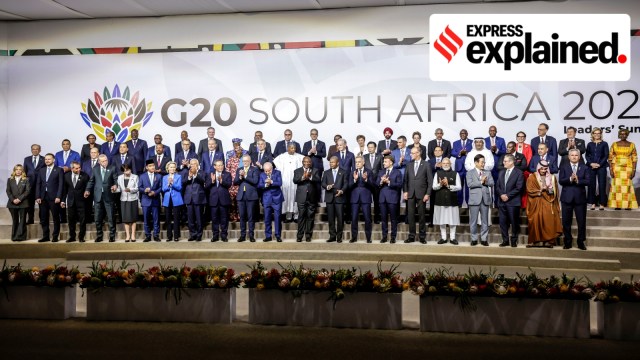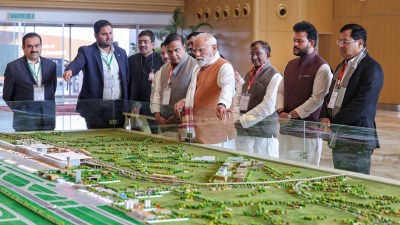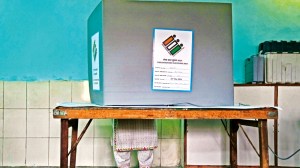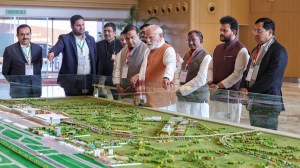Africa, climate, debt sustainability, UNSC reform: 10 key takeaways from the G20 leaders’ declaration
The declaration was made without any input from the US, which effectively boycotted the G20 Leaders’ Summit in Johannesburg, South Africa
 Leaders and delegates pose for a group photo, on the opening day of the G20 Leaders' Summit, in Johannesburg, South Africa, Saturday, Nov. 22, 2025. (Gianluigi Guercia/Pool Photo via AP)
Leaders and delegates pose for a group photo, on the opening day of the G20 Leaders' Summit, in Johannesburg, South Africa, Saturday, Nov. 22, 2025. (Gianluigi Guercia/Pool Photo via AP)Despite American objections, G20 leaders on Saturday (November 22) adopted the Summit Declaration, addressing the climate crisis and other global challenges.
The 20th G20 Leaders’ Summit was held at the Johannesburg Expo Centre on November 22-23. The summit was most notable for the absence of US President Donald Trump and Washington’s boycott of the South Africa’s presidency — because the country was allegedly committing “genocide” against white South Africans.
In that context, the G20 leaders’ declaration, especially one which mentions climate change, a term that has been anathema to the Trump White House, is significant.The declaration was drafted without input from the US.
Here are 10 key takeaways.
- 01
Acknowledges historic African summit
This declaration acknowledged the first G20 Leaders’ Summit convened on the African continent. The document mentions the African philosophy of Ubuntu, which translates to “I am because we are”, underscoring the interconnectedness of individuals within communal, societal, economic, and environmental contexts.
It is this spirit of interconnectedness that, the declaration says, drives the “commitment to ensure that no one is left behind through multilateral cooperation, macro policy coordination, global partnerships for sustainable development and solidarity.”
Amid rising geopolitical competition and instability, the leaders reaffirmed their belief in “multilateralism” to collectively tackle shared challenges.
- 02
Enhances African representation in global finance
The G20 this year has made concrete efforts to enhance the voice and representation of the developing world, particularly Africa, in global financial governance.
The leaders welcomed the creation of a 25th chair at the IMF Executive Board specifically designed to enhance the voice and representation of Sub-Saharan Africa.
Moreover, the G20 noted the achievement of exceeding $100 billion in voluntary channelling of Special Drawing Rights (SDRs) or equivalent contributions for countries in need, and the transfer to the Poverty Reduction and Growth Trust and the Resilience and Sustainability Trust. SDRs are supplementary foreign exchange reserve assets defined and maintained by the International Monetary Fund (IMF).
These reforms reinforce the G20’s commitment to an IMF that is quota-based and adequately resourced, but in which quotas are aligned with members’ relative economic positions.
- 03
Comprehensive action on debt sustainability
The G20 declaration recognised that high debt severely limits the ability of many developing economies to invest in infrastructure, healthcare, and education. It said, “debt vulnerabilities... can constrain [countries’] fiscal space, their ability to address poverty and inequality, and their capacity to invest in growth and development. The situation is particularly challenging for many low-income countries, especially those in Africa.”
The leaders, thus, reaffirmed their commitment to strengthening the implementation of the G20 Common Framework (CF) for debt treatments in a predictable, timely, and coordinated manner. They also supported exploring the voluntary use of liability management operations and debt-for-development or debt-for-climate swaps, emphasising the need to enhance debt transparency from all stakeholders, including private creditors.
“We underscore the importance of addressing gaps in debt management, debt transparency, public financial management, and domestic resource mobilisation and will continue to advance adequate capacity-building initiatives to this end.”
- 04
Scaling climate action & disaster resilience finance
The declaration emphasised on the urgency of tackling climate change by strengthening the full and effective implementation of the Paris Agreement. It highlighted the devastating impact of increasing disasters on vulnerable states, particularly Small Island Developing States (SIDs) and Least Developed Countries (LDCs).
To address this, the leaders welcomed the G20 Voluntary High-Level Principles for Investing in Disaster Risk Reduction (DRR) and reiterated the urgent need for universal coverage of early warning systems. Crucially, the declaration underscored the need to scale up global climate finance from “billions to trillions” and noted that developing countries require an estimated $5.8-5.9 trillion for their nationally determined contributions (NDCs) before 2030.
This was particularly notable given the United States’ opposition to the inclusion of climate change in the G20 declaration. After the declaration was made, the White House criticised South Africa for “weaponising” its presidency.
“It is a longstanding G20 tradition to issue only consensus deliverables, and it is shameful that the South African government is now trying to depart from this standard practice,” a senior Trump administration official told Reuters on Friday.
- 05
Mobilising finance for just energy transitions
The declaration emphasised on energy inequalities, noting that over 600 million Africans lack electricity and an estimated 1 billion lack access to clean cooking fuels, which contributes to two million African deaths annually.
“We reaffirm that energy security remains fundamental to national sovereignty, economic development, stability, and global prosperity,” the declaration stated.
To combat this, the G20 supports efforts to triple renewable energy capacity globally and double the global rate of energy efficiency improvements by 2030. The declaration welcomed the Mission 300 platform, led by the World Bank Group and the African Development Bank, dedicated to connecting 300 million people to electricity in Africa by 2030. This commitment includes mobilising varied financial sources to facilitate low-cost financing for energy transitions in developing countries.
“We emphasise that sustainable industrialisation is a cornerstone of sustainable development and energy transitions,” the declaration said.
- 06
Establishes a critical minerals framework
The G20 declaration states, “as the world economy is undergoing significant changes, including sustainable transitions, rapid digitisation and industrial innovations, the demand for critical minerals will increase.”
Based on this recognition, the leaders welcomed the G20 Critical Minerals Framework, a voluntary, non-binding blueprint designed to secure sustainable, transparent, stable, and resilient critical mineral value chains.
The Framework aims to “unlock investment in mineral exploration, promote local beneficiation at source, and strengthen governance for sustainable mining practices.” It specifically calls for investment for critical minerals exploration in developing countries; “critical minerals should become a catalyst for value-addition and broad-based development, rather than just raw material exports,” the G20 leaders declared.
“We seek to ensure that the value chain of critical minerals can better withstand disruptions whether due to geopolitical tensions, unilateral trade measures inconsistent with WTO Rules, pandemics, or natural disasters and that more producer countries can participate in and benefit from value chains.”
- 07
On global food security and the Right to Food
Alarmed that as many as 720 million people experienced hunger in 2024, the G20 declaration reaffirmed the progressive realisation of the Right to Food and the importance of open, non-discriminatory trade policies.
“We recognise the fundamental right of everyone to be free from hunger and we affirm that political will to create the conditions to expand access and affordability to safe, healthy and nutritious food is needed. We reaffirm our commitment to uphold international law, in particular international humanitarian law, and reiterate that intentional starvation of civilians should not be used as a method of warfare.”
The declaration welcomed the work of the G20 Food Security Task Force, established under the South African Presidency, which aligns with other existing frameworks on food security. It also welcomed the Ubuntu Approaches on Food Security and Nutrition, and Excessive Food Price Volatility advanced at the G20 Food Security Ministerial and which seek to address the negative impacts of excessive food price volatility, particularly for low-income households.
The G20 leaders also encouraged targeted support for African smallholder farmers and fishers, supporting the implementation of the African Continental Free Trade Area (AfCFTA), and investing in local food production to reduce dependency on volatile global supply chains.
- 08
On AI and digital inclusion for development
Recognising the transformative potential of emerging technologies like artificial intelligence (AI), the declaration welcomed the work of the G20 Task Force on Artificial Intelligence, Data Governance and Innovation for Sustainable Development.
“We will work to promote international cooperation and further discussions to unlock the full potential of AI, equitably share its benefits and mitigate risks, recognising the need to incorporate the voices of developed and developing countries.”
Notably, the declaration identified a number of issues that must be addressed “to ensure safe, secure, and trustworthy AI development, deployment and use”. These include, “the protection of human rights, transparency and explainability, fairness, accountability, regulation, safety, appropriate human oversight, ethics, biases, privacy, data protection and data governance”.
The declaration specifically highlighted the launch of the AI for Africa Initiative, a voluntary platform for multilateral and multi-stakeholder cooperation between the G20 and the African Union.
- 09
New targets for youth employment & gender parity
The declaration made crucial new commitments to social equality and employment targets.
Building on previous goals, the leaders adopted the Nelson Mandela Bay Target, which aims to reduce the rate of young people not in employment, education, or training (NEET) by a further 5 per cent by 2030 (compared to 2024 levels).
The G20 leaders also adopted the revised Brisbane-eThekwini Goal to reduce the gender gap in labour force participation by 25 per cent by 2030 (from 2012 levels). Additionally, the Leaders committed to progressively working towards reducing the unadjusted wage gap between men and women by 15 per cent by 2035.
“We commit to undertake reforms to ensure women have full and equal access and rights to economic resources, access to finance and markets to support women’s entrepreneurship and women-led businesses and cooperatives.”
- 10
Commitment to global governance & UN Reform
A recurrent theme across the declaration was a commitment to strengthening multilateralism (framed as a part of the Ubuntu philosophy). The leaders reaffirmed their commitment to act in accordance with international law and the UN Charter.
Significantly, they pledged to reform the UN Security Council through a transformative process that aligns it with 21st-century realities. This reform would make the UNSC more representative, inclusive, democratic, and accountable, specifically calling for an enlarged composition that improves the representation of underrepresented regions.
The call for UNSC reform was also made by Prime Minister Narendra Modi at a meeting with Brazil President Luiz Inácio Lula da Silva and South Africa President Cyril Ramaphosa on the sidelines of the G20 Leaders’ Summit.
Modi said global institutions “do not represent today’s world”, noting that none of the IBSA (India-Brazil-South Africa) countries is a permanent UNSC member. Institutional reform, he said, “is no longer an option, but a necessity”.
- 01
- 02
- 03
- 04
- 05






































